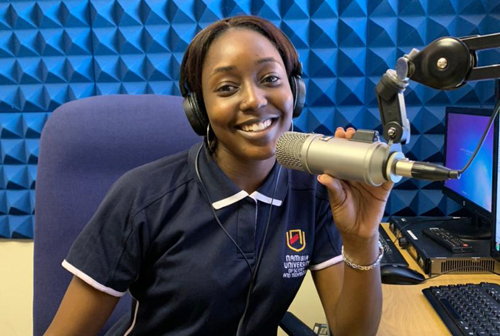The world recently celebrated the significance of radio, an intimate and personal medium that has been connecting people from across the globe since its establishment some 110 years ago.
This year, UNESCO, a specialised agency of the United Nations aimed at promoting world peace and security called on radio stations to celebrate the event’s 10th anniversary through three sub-themes which are evolution, innovation and connection.
Evolution has been noticeable in radio across the world and although in Namibia, the majority of radio stations operate in conventional ways, as well as online radios that are making waves and impacting lives equally as conventional ones.
One such is the Namibia University of Science and Technology campus radio, NUST FM.
Delila Katanga, the station’s manager said one of many challenges is the fast pace diversification of media.
“Radio no longer means soul focus on broadcasting but it also means branching out into platforms such as podcasts and videos. Ultimately, this can be difficult for online radio because of the limited funds stations have to work with. Although revenue is relatively good, it does not compare to that which is made by stations that have frequencies and this is further hindered by the Covid-19 pandemic which caused many organisations to reduce their advertising budgets, affecting many media outlets,” shared Katanga.
NUST FM was founded in July 2015 with the sole purpose of facilitating, enhancing community engagement, to disseminate information about NUST to its community and external stakeholders as well as to promote local artists and businesses to Namibia and beyond. Katanga said: “Although online radio is still a relatively new concept to the Namibian public, it is steadily gaining traction. Majority of the listeners remain the youth, this is because they are well acquainted with the internet and most of them do not own traditional radios to tune onto.”
She said the listenership keeps growing. “We are not limited to geographical location. NUST FM can be accessed from all around the world and this allows brands that advertise with us to not only reach the Namibian target audience but to have their brand introduced to the world at large,” she said.
A radio head who has more than 20 years of radio experience is Gerald Johr, the general manager of Radio Energy. “The portability of radio gives it an advantage over other types of media that require an individual's full attention, such as television, print, and social media. These new media technologies are only expanding the reach of radio and the variety of programming content that radio offers,” enlightened Johr.
He said amongst growing concerns about Covid-19, general media consumption is expectantly peaking.
Radio Energy celebrates 25 years at the end of October this year 2021. “With a 98% market reach, Radio is still the most important source of information in Namibia and elsewhere on the African continent, the stats looks the same,” shared Johr.
He stated the reason why radio is what it is today is that it still has the widest audience footprint, adding that radio’s power to entertain, educate and inform in everyday life and emergencies is just as important today as it has always been, and possibly even more so today.
He said: “Namibia does not have a reading culture; it has been proven over and over again, and with the very low trust ratio of social media, the tendency to get credible information from your favourite radio source prevails. Social Media runs out of airtime or data, radio doesn’t. Radio is free. And to top it all, radio is one of the best social mediums, fostering participation and engagement.”
Radiowave Station manager Juan Vorster told Entertainment Now! the only way Namibian radio can be made better is by constantly striving for the highest level of professionalism, making a concise effort to understand and speak to our audiences and working together towards the uplifting and promoting of Namibian businesses and the country as a whole.
He said the biggest mistake in the radio industry is lack of collaboration between competing stations. “Although we all have our own brands to build, radio as a whole would only benefit from more collaborative efforts,” he stated.
He added: “There is still a perception that radio is secondary to many other mediums, however working in the industry we see on a day to day basis the results that we can deliver for clients and local businesses. More trust and more commitment to local radio stations with this reflecting on-air is what I would like to see.”
Radiowave will be turning 23 years old in July this year. “Radio has always been a relevant medium in Namibia. We are always working towards growing as a brand but also promoting the medium as a whole. Growth can be hard to judge, but what we do know is that listenership increased greatly over the last year following the global pandemic. More people turned to radio as a companion and a source of local information which showed up in online listenership figures and increased interaction on-air. I do believe that radio in Namibia is still growing and will continue to do so,” believed Vorster.
-psiririka@nepc.com.na


